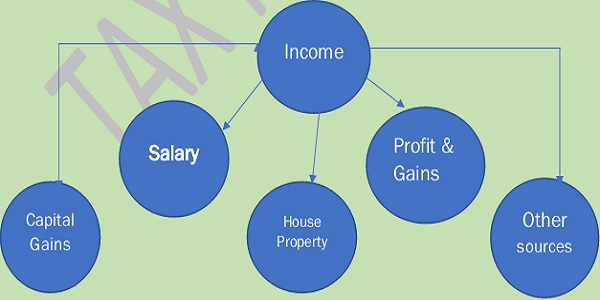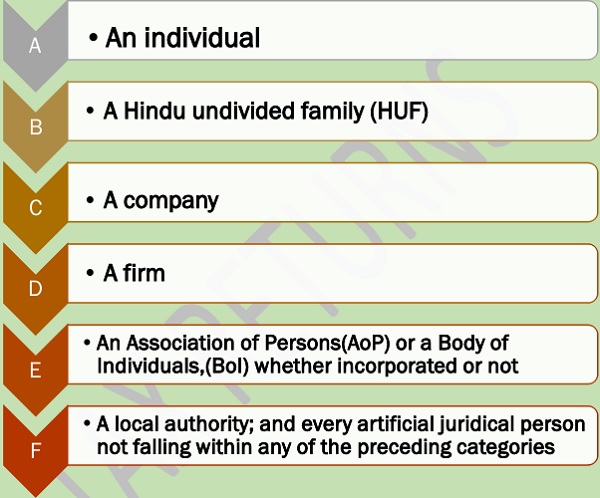Introduction:
Under the Constitution of India Central Government is empowered to levy tax on the income. Accordingly, the Central Government has enacted the Income Tax Act, 1961. The Act provides for the scope and machinery for levy of Income Tax in India. The Act is supported by Income Tax Rules, 1961 and several other subordinate and regulations. Besides, circulars and notifications are issued by the Central Board of Direct Taxes (CBDT) and sometimes by the Ministry of Finance, Government of India dealing with various aspects of the levy of Income tax. Unless otherwise stated, references to the sections will be the reference to the sections of the Income Tax Act, 1961. Income tax is a tax on the total income of a person called the assesses of the previous year relevant to the assessment year at the rates prescribed in the relevant Finance Act. Some of the important definitions under Income Tax Act, 1961 are as follows:
Income Tax Return (ITR)
Is a form which a person is supposed to submit to the Income Tax Department of India. It contains information about the person’s income and the taxes to be paid on it during the year. Information filed in ITR should pertain to a particular financial year, i.e., starting on 1st April and ending on 31st March of the next year.
Income can be of various forms such as:
- Income from salary
- Profits and gains from business and profession
- Income from house property
- Income from capital gains
- Income from other sources such as dividend, interest on deposits, royalty income, winning on lottery, etc.

ASSESSMENT YEAR – S. 2(9)
Section 2(9) defines an “Assessment year” as “the period of twelve months starting from the first day of April every year.” An assessment year begins on 1st April every year and ends on 31st March of the next year. For example, Assessment year 2012-13 means the period of one year beginning on 1 set April, 2011 and ending on 31st March, 2012. In an assessment year, income of the assesses during the previous year is taxed at the rates prescribed by the relevant Finance Act. It is therefore, also called as the “Tax Year”
PREVIOUS YEAR- S. 2(34) & S. 3
Definition:
Section 3 defines “Previous year” as “the financial year immediately preceding the assessment year”. Income earned in one financial year is taxed in the next financial year. The year in which income is earned is called the “previous year” and the year in which it is taxed is called the “assessment year” Common previous year for all source of income:
A person may earn income from more than one sources but previous year will always be common for all the sources of income. This will be so even if a person maintains records or books of accounts separately for different sources of income.
Total income of a person from all the sources of income will be taken together and considered in the previous year or the financial year immediately preceding the assessment year.
PERSON –Section 2(31)
The term “person” includes:

These are seven categories of persons chargeable to tax under the Act. The aforesaid definition is inclusive and not exhaustive. Therefore, any person, not falling in the abovementioned seven categories, may still fall within the four corners of the term “person” and accordingly may be liable to tax.
ASSESSEE–S. 2(7)
Definition:
U/s 2(7) “Assessee” means a person by whom income tax or any other sum of money is payable under the Act and it includes:
- Every person in respect of whom any proceeding under the Act has been taken for the assessment of his income or loss or the amount of refund due to him.
- A person who is assessable in respect of income or loss of another person or who is deemed to be an assessee, or
- An Assessee in default under any provision of the Act.
A minor child is treated as a separate assessed in respect of any income generated out of activities performed by him like singing in radio jingles, acting in films, tuition income, delivering newspapers, etc. However, income from investments, capital gains on securities held by minor child, etc. would be taxable in the hands of the parent having the higher income (mostly the father), unless if such assets have been acquired from the minor’s sources of income.
ASSESSMENT – S 2(8)
An assessment is the procedure to determine the taxable income of an assessee and the tax payable by him. S. 2(8) of the Income Tax Act, 1961 gives an inclusive 4 definition of assessment “an assessment includes reassessment “U/s 139 of the Act, every assessee is required to file a self-declaration of his income and tax payable by him called “return of income”.
INCOME- S 2(24)
Definition
Although, income tax is a tax on income, the Act does not provide any exhaustive definition of the term “Income”. Instead, the term ‘income’ has been defined in its widest sense by giving an inclusive definition. It includes not only the income in its natural and general sense but also incomes specified in section 2 (24).
Broadly the term “Income includes the following:
| Number | Particulars |
| 1 | Profits and gains |
| 2 | Dividend |
| 3 | Voluntary contributions received by certain institutions |
| 4 | Receipts by employees the value of any benefit or perquisite, whether convertible into money or not. |
| 5 | Incomes from business – s-28 |
| 6 | Any capital gains chargeable under section 45; |
| 7 | Any sum earlier allowed as deduction and chargeable to income-tax under Section 59 |
| 8 | Any winnings from lotteries, crossword puzzles, races including horse races, card games and other games of any sort or from gambling or betting of any form or nature whatsoever |
| 9 | Any contribution received from employees towards any provident fund or superannuation fund or Employees State Insurance Act, 1948, or any other fund for the welfare of such employees |
| 10 | Any sum received under a Keyman insurance policy including the sum allocated by way of bonus on such policy. |
| 11 | Any sum of money or value of property received as gift –S 56(2) and Shares of closely held companies transferred to another company or firm are covered in the definition of gift except in the case of transfer of such shares for reorganization of business by amalgamation or demerger etc |
SCHEME OF CHARGING INCOME TAX
Income tax is a tax on the total income of an assessee for a particular assessment year. This implies that
- INCOME–TAX IS AN ANNUAL TAX ON INCOME
- INCOME OF PREVIOUS YEAR IS CHARGEABLE TO TAX IN THE NEXT FOLLOWING ASSESSMENT YEAR AT THE TAX RATES APPLICABLE FOR THE ASSESSMENT YEAR.
- TAX RATES ARE FIXED BY THE ANNUAL FINANCE ACT AND NOT BY THE INCOME–TAX ACT.
- TAX IS CHARGED ON EVERY PERSON IF THE GROSS TOTAL INCOME EXCEEDS THE MINIMUM INCOME CHARGEABLE TO TA
Example
Marginal vs. Average Tax Rates
Family of four income of $110,000
INCOME TAX FORMS
> Form No.: ITR-1 SAHAJ
For individuals being a resident (other than not ordinarily resident) having total income upto Rs.50 lakh, having Income from Salaries, one house property, other sources (Interest etc.), and agricultural income upto Rs.5 thousand
> Form No.: ITR-2
For Individuals and HUFs not having income from profits and gains of business or profession
> Form No.: ITR-3
For individuals and HUFs having income from profits and gains of business or profession
> Form No.: ITR-4 Sugam
For Individuals, HUFs and Firms (other than LLP) being a resident having total income upto Rs.50 lakh and having income from business and profession which is computed under sections 44AD, 44ADA or 44AE
> Form No.: ITR-5
For persons other than- (i) individual, (ii) HUF, (iii) company and (iv) person filing Form ITR-7
> Form No.: ITR-6
For Companies other than companies claiming exemption under section 11
> Form No.: ITR-7
For persons including companies required to furnish return under sections 139(4A) or 139(4B) or 139(4C) or 139(4D) only
> Form No.: ITR-V
Where the data of the Return of Income in Form ITR-1 (SAHAJ), ITR-2, ITR-3, ITR-4(SUGAM), ITR-5, ITR-7 filed but NOT verified electronically
> Form No.: Acknowledgement
> Form No.: ITR-U
For persons to update income within twenty-four months from the end of the relevant assessment year
Benefits of Filing Income Tax Return
Claim of Income Tax refund Carry forward of losses to next year Income and Address Proof lip is an Essential Document Easy Loan Processing Easy Credit Card Processing Hassel Free Approval of Visa Application Avoid Penalty Excess Intrest Can be Avoided







It’s really helpful full ma’am